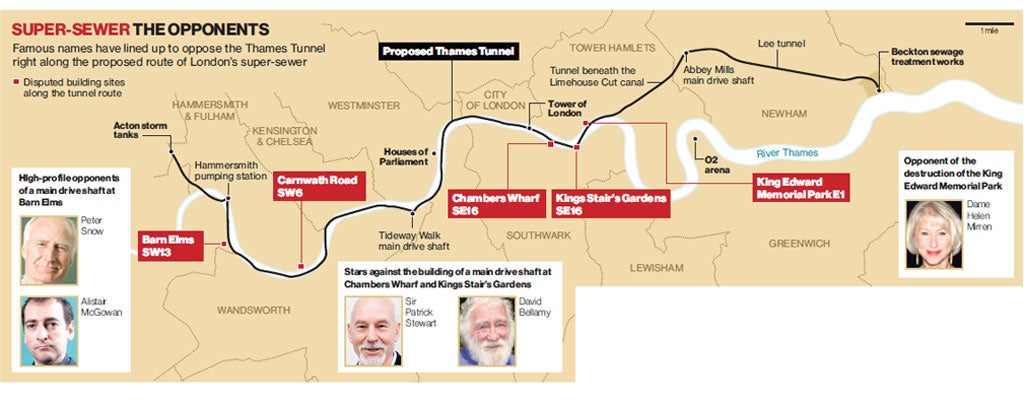Celebrities and activists kick up stink over plan for capital super-sewer
Thames Water's £3.6bn plan for sewer under the Thames is disruptive and unnecessary, report says

Nobody wants a major construction site in their backyard, but throw effluent into the equation and the stink of a nimby backlash is even more pungent than usual.
The proposal to excavate a £3.6 billion "super-sewer" beneath the Thames, intended to stop 39 million tons of raw human waste being flushed straight into London's main river every year, has suffered its latest setback.
Following campaigns by residents and celebrities, a report commissioned by Hammersmith and Fulham Council has recommended a shorter and cheaper alternative be considered, despite insistence from Thames Water that it would not work.
The utility firm's tunnel would be wide enough to drive three buses through, but instead of carrying traffic would ensure that heavy rainfall no longer forces London's sewer network to overflow into the Thames.
Requiring seven years of building work at 22 sites, however, some are sceptical that the disruption is necessary. The actor Sir Patrick Stewart and environmentalist David Bellamy oppose work in Southwark, Dame Helen Mirren in Wapping, and impressionist Alistair McGowan and TV presenter Peter Snow want to protect a park in Richmond.
The action group Residents Against Thames Sewer (Rats), claim digging in Fulham will cause "asthma, bronchitis, eye irritation, emphysema, heart disease and cancer".
The Thames Tunnel Commission, led by Lord Selborne, pre-empted Friday's opening of a second phase of consultation by saying there was substantial evidence pointing to "a smarter way to make the River Thames cleaner".
"A shorter tunnel, combined with green infrastructure solutions that are built up incrementally... would be both compliant with EU directives and less costly and disruptive to Londoners," the commission said.
Thames Water's Nick Tennant said a shorter tunnel would still involve unpopular construction work. He pointed out that sewage would still enter the Thames and that data modelling using rainfall levels in June proved it could also make matters worse.
"The theory behind the shorter tunnel is that it could hold the sewage until the storm has gone, but when you have two storms in rapid succession the tunnel wouldn't have time to empty, so you'd have had sewage under Hammersmith for 16 days. Sewage going nowhere smells, so you'd be creating an odour problem in west London."
Mr Tennant added: "I think the phase two of consultation will reassure local residents that the impact can be mitigated. There are precedents in similar schemes overseas where you basically put a roof over the construction."
Join our commenting forum
Join thought-provoking conversations, follow other Independent readers and see their replies
Comments
Bookmark popover
Removed from bookmarks